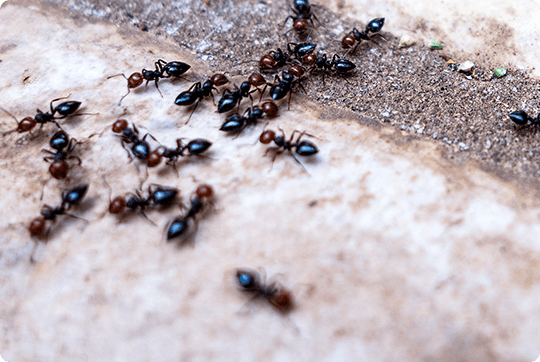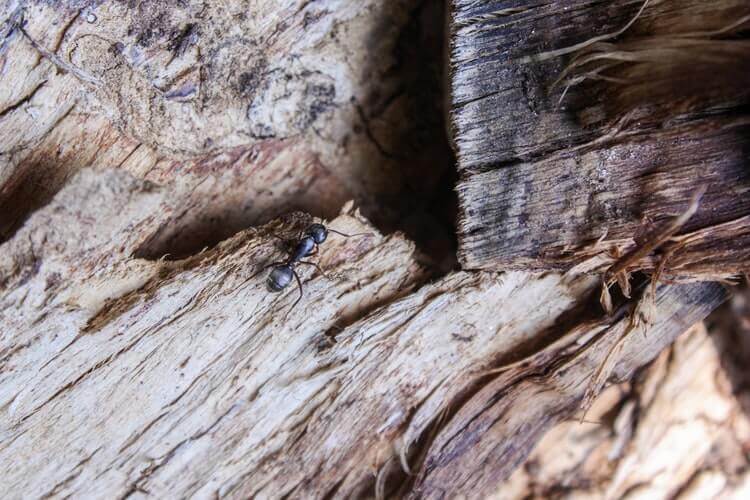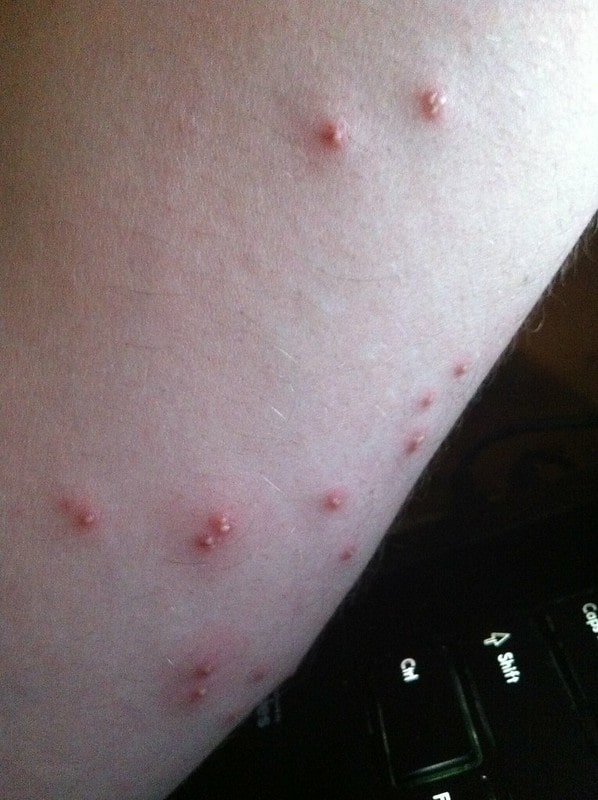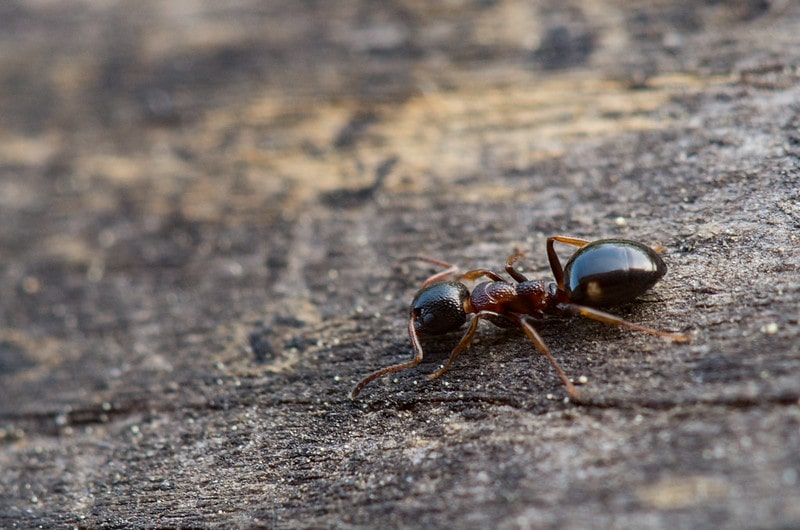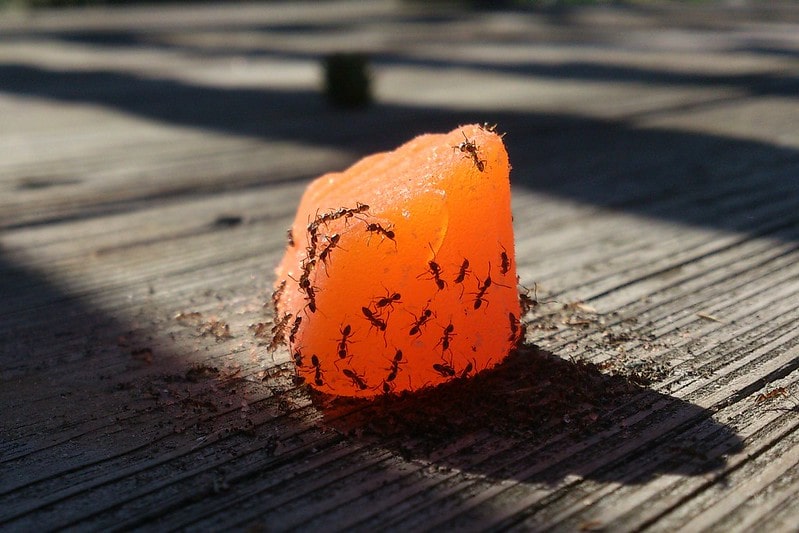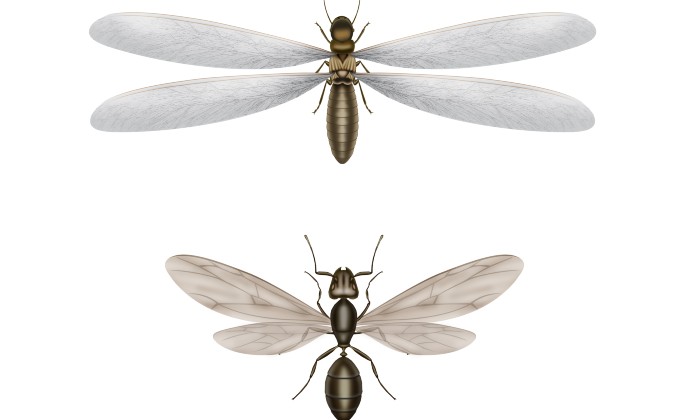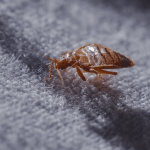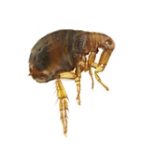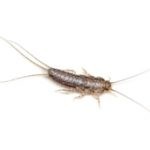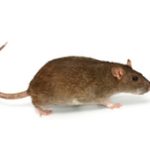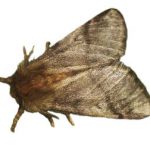How to Get Rid of Ant Infestation in Your Home?
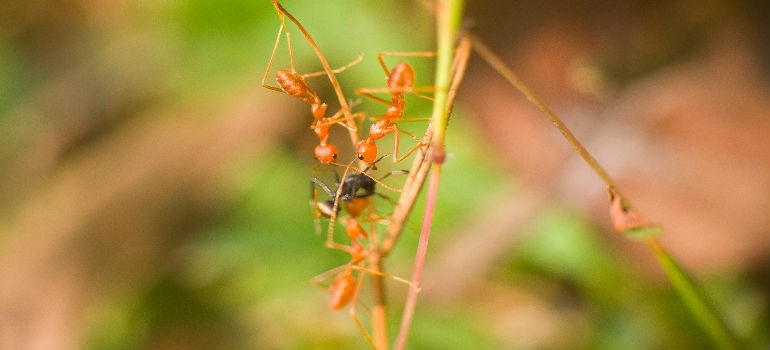
Ant infestations are a common household problem in the UK. These tiny intruders can quickly take over your kitchen, pantry, or even living spaces, making it frustrating to deal with them.
Fortunately, there are many ways to get rid of ants in the house naturally. Whether you prefer eco-friendly ant deterrents or chemical solutions, this guide will help you tackle the problem and prevent future ant infestations.
Why do I have ants in my house?
Ants are always on the lookout for food, and even tiny crumbs can be enough to bring them inside. Sweets, syrups, soda spills, and fruit attract sugar-loving ants. Cooking oils, butter, and greasy residues on countertops can lure ants. Open containers of flour, cereal, and sugar are easy for ants to invade.
Ants need water to survive, and a damp environment can attract them into your home. Also, ants look for safe places to build their nests, and your home might provide the perfect environment.
Signs of ant infestation in house
Signs of an ant infestation in the house include visible ant trails, particularly in the kitchen or near food sources. You may notice groups of ants around food crumbs, sugary substances, or pet food. Nesting sites may also be visible, such as ant hills or small holes in walls, floorboards, or near windows. Another sign is ants in unusual places, like bathrooms or living rooms, where they typically don’t forage. If you spot flying ants, it could indicate an established colony preparing to reproduce. A strong ant odour or the presence of discarded wings may also signal an infestation.
Types of ants that infest UK homes
In the UK, several types of ants can invade houses, especially during the warmer months. Most species of ants are harmless, but some may pose a nuisance by foraging for food or damaging property. Home ant infestations in the UK can be:
- The black garden ant– The black garden ant is the most frequently encountered species in UK homes. These ants, as the name suggests, can be found primarily in gardens. They prefer to build nests in the soil or beneath paving stones and patios. Speaking of their eating habits, garden ants have quite the sweet tooth but are also quite partial to high protein foods, such as meat and pet food.
- Roger’s ant – This ant, which is almost completely blind, prefers to forage underground, but still a pest in the UK. Unlike their garden cousins, these small reddish-brown ants do not follow or leave trails for others. This is because they hunt live prey. They like to build their nests in damp areas, such as around drains and behind the cracked kitchen or bathroom tiles. These locations offer them easy access to their moisture-loving prey, such as springtails and other household pests that love dark, damp areas.
- Pharaoh’s ant – Pharaoh ants are a serious problem in UK homes, especially in warm indoor spaces like kitchens and hospitals. It is the most common type of ant you may find in your home as the Pharaoh ant builds their nests almost exclusively indoors. Pharaoh ants are voracious foragers and will swarm upon any source of food with high protein, such as meat, fat, dead insects, and blood. They tend to build their nests in hard-to-reach areas of heated buildings and, since each colony can support multiple queens, it doesn’t take long for them to build a substantial population.
- Flying ants – They have bent antennas, pinched waist unequal length wings. Flying ants are just ordinary ants with wings. These ants fly to establish new colonies. In order to save themselves from extinction, the ants take to the skies so the queens can mate with males from another colony.
- Ghost ants – Ghost ants are becoming more common in UK homes due to their ability to thrive indoors. These tiny, almost translucent ants are worthy of their name as they are quite easy to miss. They prefer to build their nests in areas with a lot of moisture, such as behind bathroom cabinets and under the kitchen sink. When indoors, they will forage for sweet or greasy foods.
- Pavement ants – Pavement ants (Tetramorium caespitum) are a common ant species found in the UK urban areas, often nesting in cracks in pavements, driveways, and patios. These little dark ants are mostly seen during the warmer months of spring and summer but, if they nest indoors, they will swarm you all year long. Unlike the others mentioned on this list, the Pavement ant is not a picky eater. They will eat whatever they can find, but their preference is similar to a lot of humans – meat, starchy substances, and sweets.
Thankfully, the types of ants which inhabit UK are tame in comparison to some of the more aggressive species found in warmer climates. As such, we do not have to deal with massive colonies which are capable of devouring everything in their path.
How to get rid of ants in the house
Natural ingredients and household items can be used to get rid of ants in your house. Then you know what types of ants infested your house, it is time to learn how to get rid of the ants indoors. When facing ants, there are two routes you can take to stop them from entering the house.
The first method is by using commercial insecticides. The second one is by using natural homemade solutions. Which one you’ll use will boil down to how you feel about using potentially toxic chemicals in your home. A process of trial and error to find the best solution for your situation is sometimes required as there are varying levels of infestation.
Regardless of whether you choose a commercial or a natural solution, there is a little bit of scouting work to do before committing ant extermination.
With ant infestations, it can be tempting to kill every ant insight, but it is important to first take a step back to understand the ant society. The ants you see are just the workers and foragers. They are only responsible for finding food and bringing it back to the nest for their queen. You need to kill the queen in order to kill the colony. Another way is to cut their path by intervening with the chemicals they leave behind that lead them to your food.
Read: Biting of stinging insects
What is a natural repellent for ants?
All of the home remedies can be effective nonetheless but in severe ant infestations, months may pass before a full ant colony eradication. Here are some fairly effective natural ant deterrents that you can find in your home:
Boric acid
One of the most effective methods of getting rid of ants is to use boric acid mixed with sugar or syrup. Since ants love sweet things, they will be drawn to the mixture and carry it back for the ant queen to eat:
- Mix boric acid and sugar in a ratio of 1:3.
- Stir in 1.5 parts of hot water until the mixture turns into a syrup-like paste.
- Place the mixture around the entrances to the nest.
- Repeat until there are no more ants left.
Why this works: Boric acid damages ants’ exoskeletons, as well as their internal organs. Once ants eat it, they will quickly die.
Lemons
While the lemon method will not kill the ants or their queen, it is a powerful deterrent and can force the colony to relocate:
- Find all ant entrances.
- Squeeze the juice of 1 whole lemon into every ant entrance you have found.
- Place leftover pieces of lemon peel around the entrances.
- Replace the peels daily until there are no more ants.
If this isn’t working, dilute the juice from four lemons in one litre of water and use a baster to squirt this concoction into the nest entrances. You can also use this mixture to clean your floor and kitchen counters to remove any scent trails used by the ants.
Why this works: Ants and other insects hate the smell of citrus and will go to great lengths to avoid it. The acidic nature of lemon juice also destroys scent trails.
White vinegar
White vinegar can be used in its undiluted or diluted form to get rid of ants. If you don’t mind the smell, use 1 litre of vinegar and a baster to squirt it directly into each of the nest entrances. If the white vinegar smell is too strong, follow the steps below:
- Mix white vinegar with water in a 1:1 ratio.
- Pour the mixture into a clean spray bottle.
- Spray your floor, worktops, skirting board, and nest entrances.
- Wipe up any dead ants after 30-45 minutes.
- Repeat until you stop seeing ants.
Why white vinegar works: Undiluted white vinegar does kill ants shortly after they come into contact with it. However, diluted vinegar acts as a powerful deterrent due to its strong smell and its ability to remove scent trails.
Essential oils
This ant deterrent is best used after resolving an infestation. You can get rid of ants immediately with Peppermint, citrus or Tea tree essential oil.
For ant repellent, mix 10-20 drops of the essential oil with 2 cups of water and spray around entry points. Wipe skirting boards and ant entrances with your chosen essential oil. You can soak cotton wool balls in the essential oil and place in cupboards and cabinets to deter ants.
Diatomaceous earth
Diatomaceous Earth (or DE for short) is arguably the most suitable natural substance that can banish the ants from the face of your home. It’s basically dust made of little algae plants’ bones, but their edges are sharp enough to penetrate through the exoskeletons of insects and kill them.
Unlike chemical pesticides, DE does not work through ingestion but instead kills ants through direct contact. Look for ant trails, nests, and entry points around your home. Lightly dust dry food-grade diatomaceous earth in areas where ants are active. Focus on entry points, baseboards, under appliances, and along ant trails.
For outdoor use, sprinkle DE around foundations, patios, and garden beds. To eliminate entire ant colonies, combine DE with ant bait stations. If you can’t find the trail, sprinkle around the most common areas where ants could lurk in or come from: the garbage bin, the windowsills, under the cupboards or behind the fridge.
Under no circumstances use DE meant for swimming pools. It contains highly concentrated crystalline silica because of its production method, which makes it ideal for cleaning pools but also harmful to pets and children if ingested.
Chalk
It’s important not to mistake this with Chinese chalk, which is an insecticide by nature. We mean classroom chalk, that’s made from calcium carbonate (CaCO3).
Here’s how to apply chalk to stop ants from entering your property:
- Find where the ants are entering from.
- Draw a chalk line around the ant entry points.
- Repeat over the line at least 3 times.
- Redraw the lines in 4 days.
Why chalk works: Some species of ants dislike walking on powdery substances that can interfere with their scent trails. Calcium Carbonate is one such substance.
Commercial insecticide for ants in the house
There are many products available for getting rid of ants, the most common being ant insecticide sprays. These products are specifically designed to kill ants on contact or eliminate entire colonies through baiting systems. Choosing the right insecticide depends on the severity of the infestation.
While sprays are excellent for killing the worker ants, they won’t affect the queen who is hiding in the depths of the nest. The best commercial options for removing an ant infestation are:
- Ant gel baits: This poisonous gel works in the same way as boric acid and sugar. It has a sweet scent and taste to attract ants. Once it is taken back to the nest and consumed, the ants will die. Apply ant gels along trails & near nests.
- Ant powdered poison: This poison is again mistaken for food by ants. As such, they will carry it back to the nest for the queen and the others to feast upon. Apply in cracks, crevices, & ant nests.
- Ant bait station: Contain a slow-acting poison mixed with an attractant. Worker ants carry the bait back to the colony, poisoning the entire nest. Place ant bait stations near ant trails.
For long-term ant pest control, baiting systems are the best option, while sprays and powders work well for immediate relief.
Check also: Horrifying Zombie Ants: It’s a Real Thing!
Professional ant removal services UK
If you have tried all, or a mixture of, the methods above, but the ants are still resisting your removal attempts, it is time to call in the professional ant exterminator.
An ant exterminator will inspect your property, assess the severity of the infestation, and look for ants’ entry points. Upon completion of the inspection, an ant removal technician will conduct the treatment, ensuring that all ants have been eradicated.
The ant control expert will apply a professional grade insecticide powder/gel bait to every area the ants use to enter your home. The powder is viewed as food and also has a residual effect, so it will remain effective for some time after being taken into the nest.
How to prevent ants from returning
Keeping your home clean, fixing leaks, and sealing gaps can help prevent ants from invading. Getting rid of an ant infestation is only half the battle. Make your home less inviting to prevent ants from returning. Here’s how to keep ants away:
- Clean – Since ants venture into our homes in search of food, one of the best ways to prevent future incursions is to keep your kitchen and home clean. Make sure to avoid leaving food out in the open and clean any spilt products, such as juice, honey or jam. Keep your floor and worktops clear of any crumbs or pieces of food that attract ants.
- Seal any holes or cracks – To permanently get rid of ant invasions you’d need to seal any possible entrances in the exterior and interior walls. Have a look around your home and seal the places ants were using to gain entry.
- Kill scouting ants – If a “scout” discovers a good meal it goes back to the colony alerting them about the findings. It will leave a scent trail leading to the treasure. Whenever you spot a single ant scavenging your kitchen it is a Scouting ant. Kill it right there and then to prevent it from telling others where the food supplies are located.
- Wrap kitchen food in plastic bags – Whatever it is you need to leave out of the fridge for the day – store in containers or plastic bags. This will prevent scouts from getting their antennae on it, putting a stop to future ant raids. Don’t leave pet food sitting out overnight.
In conclusion
Getting rid of ants in the house UK requires a strategic approach to eliminate the infestation and prevent future invasions. House ants are often attracted by food sources, moisture, and accessible entry points. To get rid of ants, start by sealing cracks, cleaning surfaces to remove ant trails, and using ant bait stations to target the colony. Natural ant killer spray such as vinegar or peppermint oil, can deter ants without harsh chemicals, while borax ant killer is an effective DIY solution.
For persistent infestations, professional ant removal services offer ant extermination treatments, ensuring long-term control.
Consider that we give information on possible ways to get rid of ants. However, we cannot guarantee that all of the above approaches will work for you.



